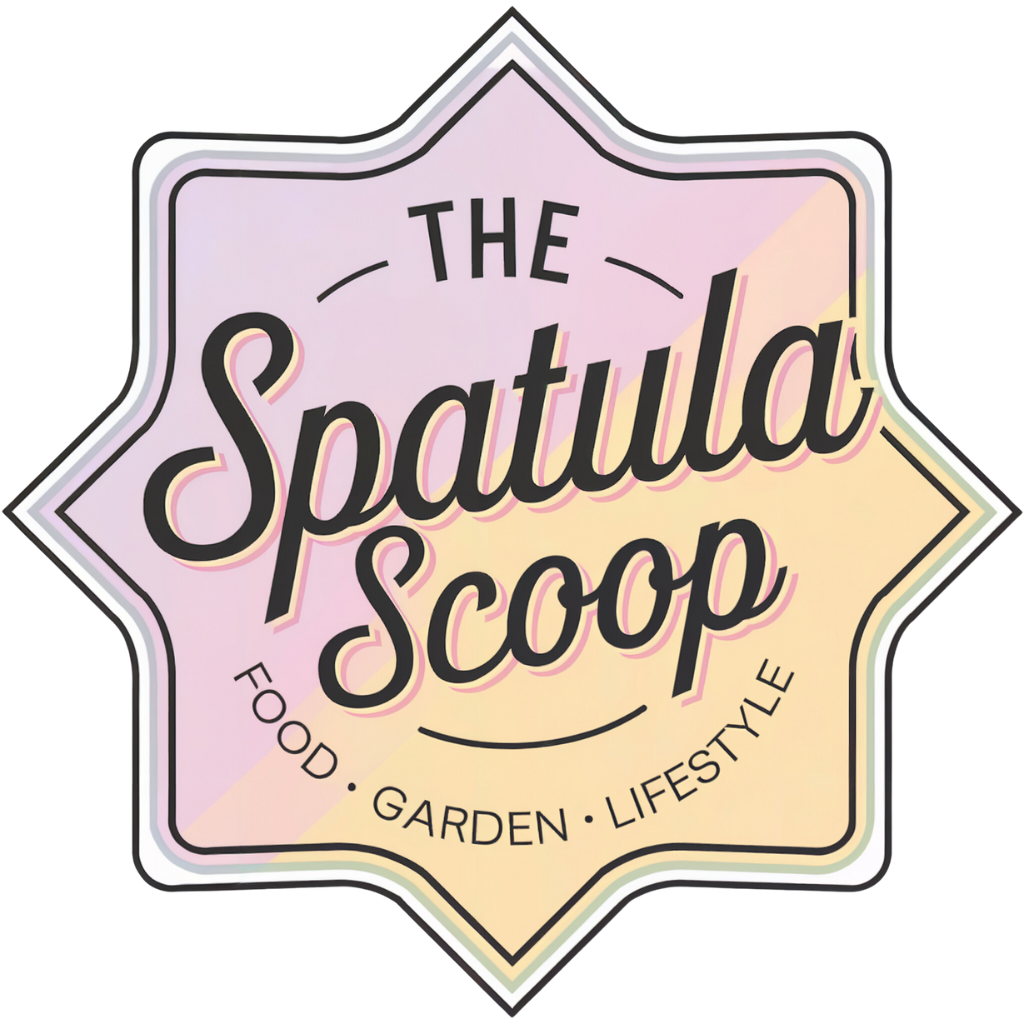Is It Safe to Eat Honeycomb
Honeycomb is generally safe to eat, offering unique nutritional benefits. It's rich in natural sugars, vitamins, minerals, and enzymes. However, you should be aware of potential risks. If you have bee product allergies, exercise caution as reactions can occur. Ensure you source honeycomb from reputable producers and inspect it for contamination. Consume it in moderation, especially if you're diabetic or monitoring blood sugar. The beeswax component isn't fully digestible, so proper chewing is important. While rare, unsanitized honeycomb may harbor bacteria, so proper handling and storage are essential. For most people, honeycomb is a safe, nutritious treat, but understanding its composition and potential effects can help you enjoy it responsibly.
This post may contain affiliate links. If you make a purchase through these links, I may earn a commission at no additional cost to you. Additionally, portions of this post may be generated using artificial intelligence (AI) technology. While we strive for accuracy, please be aware that AI-generated content may not always be perfect and should be fact-checked when necessary.
The Spatula Scoops
- Honeycomb is generally safe for most people to eat, containing natural sugars, vitamins, minerals, and enzymes.
- Beeswax in honeycomb is non-toxic and considered safe for consumption, though it's not fully digestible.
- Individuals with bee product allergies should exercise caution and consult a healthcare professional before consuming honeycomb.
- Proper handling and storage of honeycomb is crucial to prevent bacterial contamination and maintain food safety.
- Infants under one year old should not consume honeycomb due to the risk of botulism.
What Is Honeycomb
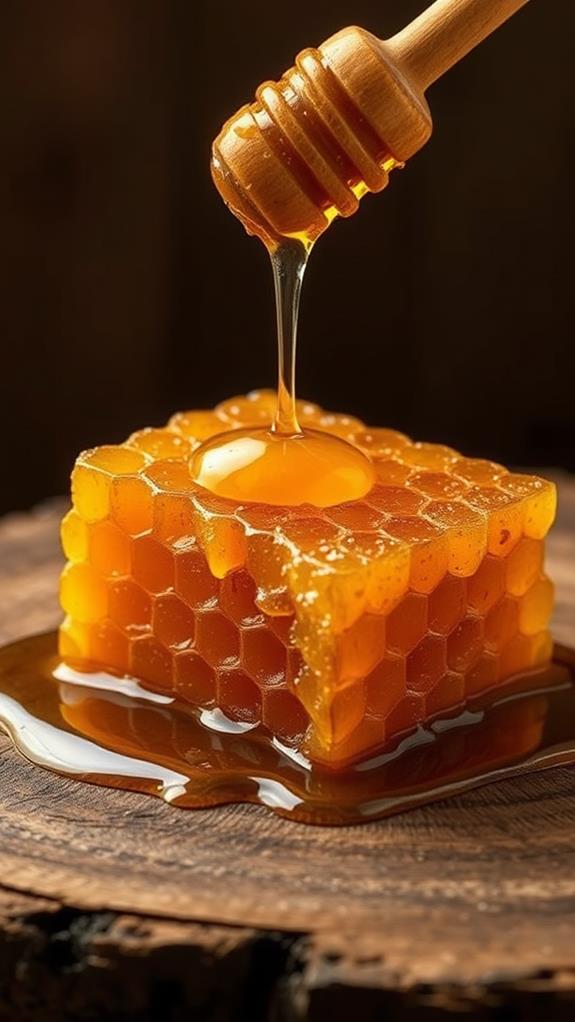
Honeycomb is the natural wax structure bees create to store honey and pollen. When you look at a honeycomb, you'll see a series of hexagonal cells made of beeswax. These cells serve as storage units for the hive's resources and nurseries for developing bee larvae. The essential warmth of cinnamon sticks can complement the natural sweetness of honeycomb when used together in culinary applications.
The wax used to construct the honeycomb is produced by worker bees. They secrete wax from special glands on their abdomens, which they then shape into the familiar hexagonal pattern. This shape is incredibly efficient, allowing bees to maximize storage space while using minimal materials.
In a honeycomb, you'll find both capped and uncapped cells. Capped cells contain fully ripened honey or developing bee larvae, while uncapped cells may hold nectar that's still being processed into honey. The honeycomb's structure also plays a vital role in maintaining the hive's temperature and humidity.
When harvested for human consumption, honeycomb often includes both the wax structure and the honey within it. This raw, unprocessed form of honey is prized for its natural state and unique texture.
Nutritional Value of Honeycomb
When you're considering the nutritional value of honeycomb, you'll want to look at its calories, macronutrients, vitamins, minerals, and beneficial enzymes. Honeycomb is primarily composed of sugar and water, with trace amounts of proteins, vitamins, and minerals. Similar to unsweetened cacao powder, honeycomb offers a rich flavor profile without added sugars, making it suitable for health-conscious individuals. The wax itself isn't digestible, but it contains propolis and bee pollen, which offer additional health benefits and enzymes that can aid digestion.
Calories and Macronutrients
Understanding the nutritional value of honeycomb can help you make informed dietary choices. When you consume honeycomb, you're primarily ingesting carbohydrates in the form of sugars. A typical 1-ounce (28-gram) serving of honeycomb contains approximately 70-80 calories, with most of these coming from its sugar content.
The macronutrient profile of honeycomb is chiefly carbohydrates, specifically fructose and glucose. You'll find little to no protein or fat in honeycomb. However, it's worth noting that the beeswax component, while edible, isn't digestible and passes through your system unchanged.
In terms of micronutrients, honeycomb contains small amounts of vitamins and minerals. These include trace amounts of vitamin C, calcium, and iron. The exact nutritional composition can vary depending on the flowers the bees visited to produce the honey.
When incorporating honeycomb into your diet, be mindful of its high sugar content. While it's a natural sweetener, it can still impact your blood sugar levels. If you're monitoring your carbohydrate intake or managing diabetes, you'll want to account for the sugars in honeycomb when planning your meals.
Vitamins and Minerals
Beyond its sweet taste, honeycomb offers a range of micronutrients that contribute to its nutritional profile. You'll find various vitamins and minerals in this natural treat, though in relatively small amounts. Honeycomb contains trace amounts of B vitamins, including thiamine, riboflavin, and niacin. These vitamins play essential roles in energy metabolism and nervous system function.
In terms of minerals, honeycomb provides small quantities of calcium, copper, iron, magnesium, manganese, phosphorus, potassium, and zinc. While not present in significant amounts, these minerals contribute to overall health, supporting bone strength, immune function, and cellular processes. It's worth noting that the exact mineral content can vary depending on the flower sources visited by the bees.
Interestingly, honeycomb also contains propolis, a resin-like substance produced by bees. Propolis is rich in flavonoids and phenolic compounds, which have antioxidant properties. These compounds may help protect your cells from oxidative stress and support your immune system. However, it's important to remember that honeycomb shouldn't be relied upon as a primary source of vitamins and minerals in your diet. It's best enjoyed as part of a balanced eating plan.
Beneficial Enzymes Present
Within honeycomb, you'll find a variety of beneficial enzymes that contribute to its nutritional value. These enzymes, naturally produced by bees, play indispensable roles in your digestive system and overall health. One of the most important enzymes is glucose oxidase, which helps convert nectar into honey and produces hydrogen peroxide, a natural preservative.
You'll also encounter diastase, an enzyme that breaks down complex carbohydrates into simpler sugars, aiding in digestion. Invertase, another enzyme present in honeycomb, assists in converting sucrose into glucose and fructose. This process makes the sugars more readily available for your body to use as energy.
Honeycomb contains catalase, an antioxidant enzyme that helps protect your cells from oxidative stress. Additionally, you'll benefit from phospholipase, which has anti-inflammatory properties. These enzymes work together to support your immune system and promote overall well-being.
It's worth noting that the enzyme content in honeycomb can vary depending on factors such as the type of flowers the bees visited and the processing methods used. To maximize the benefits of these enzymes, it's best to consume raw, unprocessed honeycomb.
Potential Health Benefits
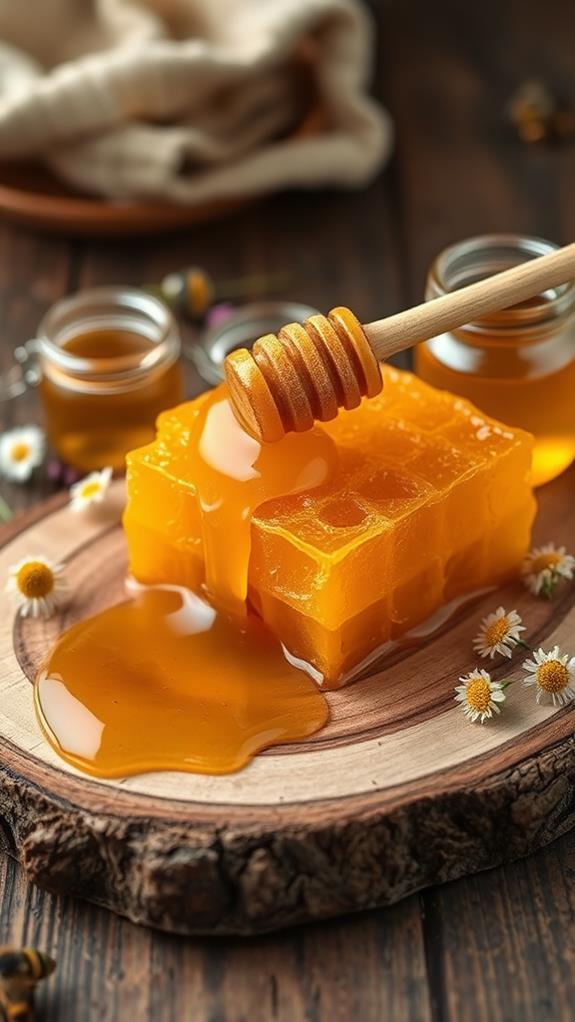
When you consume honeycomb, you're not just indulging in a sweet treat; you're also benefiting from a nutrient-rich natural sweetener that's packed with vitamins, minerals, and antioxidants. Much like organic shredded coconut, honeycomb is a versatile and nutritious ingredient that can enhance various recipes and promote healthier meals. Honeycomb may offer potential antimicrobial properties, which could help fight off harmful bacteria and support your immune system. Additionally, the beeswax in honeycomb might aid in supporting digestive health by promoting the growth of beneficial gut bacteria and potentially alleviating symptoms of digestive disorders.
Nutrient-Rich Natural Sweetener
Honeycomb isn't just a tasty treat; it's a nutrient-rich natural sweetener that offers potential health benefits. When you consume honeycomb, you're ingesting a complex blend of nutrients, including vitamins, minerals, and enzymes. It's rich in antioxidants, particularly flavonoids, which may help protect your cells from damage caused by free radicals.
Unlike processed sugars, honeycomb provides a more balanced energy source. Its natural sugars are accompanied by trace amounts of nutrients like calcium, potassium, and magnesium. These minerals contribute to various bodily functions, including bone health and muscle function. The beeswax in honeycomb contains long-chain fatty acids and alcohols, which may have anti-inflammatory properties.
Honeycomb also contains small amounts of propolis, a resin-like substance with potential antimicrobial and antifungal properties. This could contribute to its ability to support immune function. Additionally, the natural enzymes present in raw honeycomb may aid in digestion. While more research is needed to fully understand these benefits, incorporating honeycomb into your diet as a natural sweetener could be a nutritious alternative to refined sugars.
Potential Antimicrobial Properties
A fascinating aspect of honeycomb is its potential antimicrobial properties. When you consume honeycomb, you're not just enjoying a sweet treat; you're also potentially benefiting from its natural ability to fight harmful microorganisms. Honey, in general, has been recognized for its antimicrobial effects, and honeycomb may offer these benefits in a concentrated form.
The antimicrobial properties of honeycomb are primarily attributed to its high sugar content, low moisture content, and the presence of hydrogen peroxide. These factors create an environment that's inhospitable to many bacteria and fungi. Additionally, honeycomb contains propolis, a resinous substance bees use to seal their hives, which has shown antimicrobial activity against various pathogens.
Research suggests that consuming honeycomb might help support your immune system and potentially aid in fighting off certain infections. However, it is crucial to recognize that while these properties are promising, more scientific studies are needed to fully understand the extent of honeycomb's antimicrobial effects on human health. As with any natural remedy, it is best to consult with a healthcare professional before relying on honeycomb for its antimicrobial benefits.
Supports Digestive Health
Three key ways honeycomb can support your digestive health make it a valuable addition to your diet. First, it contains prebiotics, which are non-digestible fibers that feed the beneficial bacteria in your gut. These prebiotics help maintain a healthy balance of microorganisms in your digestive system, promoting ideal digestion and nutrient absorption.
Secondly, honeycomb's natural enzymes can aid in breaking down food more efficiently. These enzymes, such as diastase and invertase, work alongside your body's digestive enzymes to improve the breakdown of complex carbohydrates and sugars. This can lead to better digestion and potentially reduce issues like bloating or indigestion.
Lastly, honeycomb's antimicrobial properties may help combat harmful bacteria in your digestive tract. By inhibiting the growth of pathogenic microorganisms, it can contribute to a healthier gut environment. This benefit is particularly relevant for those prone to digestive issues or infections.
When incorporating honeycomb into your diet, start with small amounts to assess your tolerance. While generally safe for most people, those with bee allergies or diabetes should consult their healthcare provider before consuming honeycomb regularly.
Safety Concerns
Safety is paramount when considering any food, and honeycomb is no exception. While it's generally safe to eat, there are a few concerns you should be aware of. First, if you're allergic to bee venom or pollen, you might react to honeycomb. It's of utmost importance to consult with your doctor if you have any allergies before trying honeycomb.
Another consideration is dental health. The wax in honeycomb is edible but can stick to your teeth, potentially causing discomfort or even damaging dental work. To minimize this risk, you can:
- Chew slowly and carefully
- Rinse your mouth with warm water after eating
- Use dental floss to remove any stuck wax
- Avoid honeycomb if you have sensitive teeth
- Consider removing the wax before consuming
Lastly, it is absolutely critical to source your honeycomb from reputable suppliers. Raw honey products can sometimes contain botulism spores, which are particularly dangerous for infants and immunocompromised individuals. Always check the source and quality of your honeycomb to guarantee it's safe for consumption. By being aware of these potential issues and taking appropriate precautions, you can enjoy honeycomb safely as part of your diet.
Allergies and Sensitivities
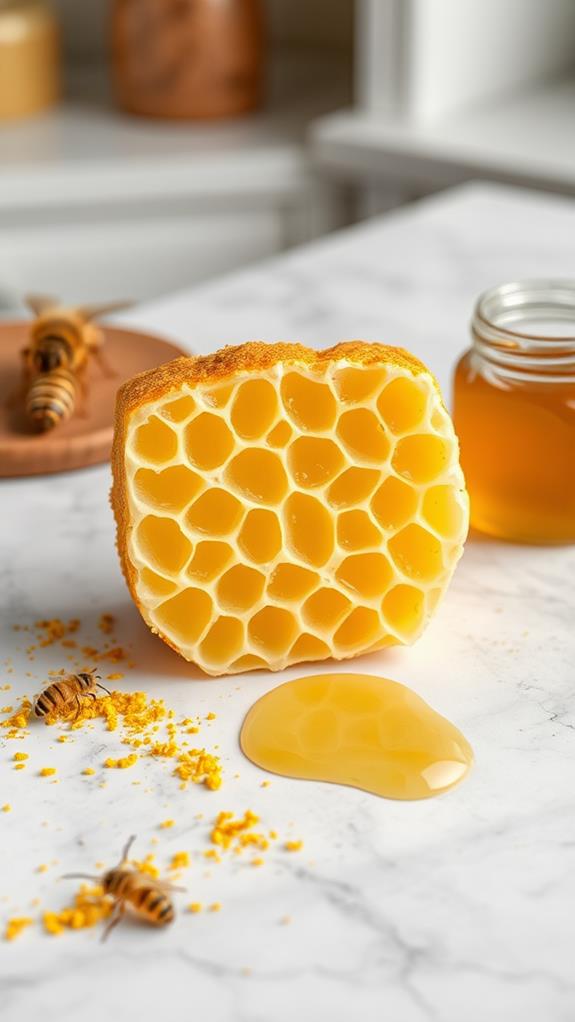
While honeycomb is generally safe for most people, it is vital to be aware of potential allergies and sensitivities. If you're allergic to bee stings, you might also react to honeycomb. This cross-reactivity occurs due to similar proteins found in both bee venom and honey products. It is crucial to consult your allergist before trying honeycomb if you have a known bee sting allergy.
You should also be cautious if you have pollen allergies. Honeycomb contains trace amounts of pollen, which might trigger an allergic response in sensitive individuals. Symptoms can range from mild itching to more severe reactions like swelling or difficulty breathing. If you experience any of these symptoms after consuming honeycomb, seek medical attention immediately.
Some people may have sensitivities to the wax content in honeycomb. While beeswax is generally considered safe for consumption, it can cause digestive discomfort in some individuals. If you notice any gastrointestinal issues after eating honeycomb, it is best to avoid it in the future. Remember, everyone's body reacts differently, so pay attention to your own responses when trying new foods like honeycomb.
Preparing Honeycomb for Consumption
When you're ready to enjoy honeycomb, you'll need to know how to properly clean, store, and serve it. Cleaning honeycomb is relatively simple, but proper storage is essential to maintain its freshness and prevent crystallization. You'll find that honeycomb pairs wonderfully with a variety of foods, from cheese and fruits to baked goods and beverages, enhancing both sweet and savory dishes.
Cleaning and Storing Honeycomb
Preparing honeycomb for consumption is a straightforward process that doesn't require extensive cleaning. You'll find that honeycomb is naturally clean, as bees maintain a sterile environment within their hives. However, you should still take some precautions to guarantee it's ready for storage and consumption.
To clean and store your honeycomb:
- Gently brush off any loose debris or dead bees
- Inspect for any signs of mold or discoloration
- Cut the honeycomb into manageable pieces
- Place the pieces in an airtight container
- Store in a cool, dry place away from direct sunlight
When storing honeycomb, it's imperative to keep it at room temperature or slightly cooler. Avoid refrigeration, as this can cause the honey to crystallize and alter its texture. If you're planning to keep it for an extended period, consider vacuum-sealing the honeycomb to preserve its freshness and prevent oxidation.
Remember that honeycomb has a long shelf life due to its natural antibacterial properties. However, it's best to consume it within a year for perfect flavor and texture. By following these storage guidelines, you'll ensure that your honeycomb remains fresh and delicious for your enjoyment.
Serving and Pairing Suggestions
Honeycomb offers a versatile range of serving options and pairing possibilities. You can enjoy it straight from the comb, savoring its unique texture and intense flavor. For a simple appetizer, slice the honeycomb into small squares and serve it on a cheese board alongside various cheeses, fruits, and nuts. It pairs exceptionally well with sharp cheddar, creamy brie, or tangy blue cheese.
If you're looking to incorporate honeycomb into your meals, try crumbling it over salads for a sweet crunch or melting it onto warm toast for a luxurious breakfast treat. For desserts, honeycomb makes an excellent topping for ice cream or yogurt. You can also use it as a natural sweetener in tea or drizzle it over pancakes and waffles.
When pairing honeycomb with beverages, consider complementing its sweetness with bold flavors. It works well with full-bodied red wines, dark beers, or even whiskey. For non-alcoholic options, try pairing it with herbal teas or sparkling water with citrus. Remember, a little honeycomb goes a long way, so use it sparingly to avoid overpowering other flavors in your dishes.
Culinary Uses
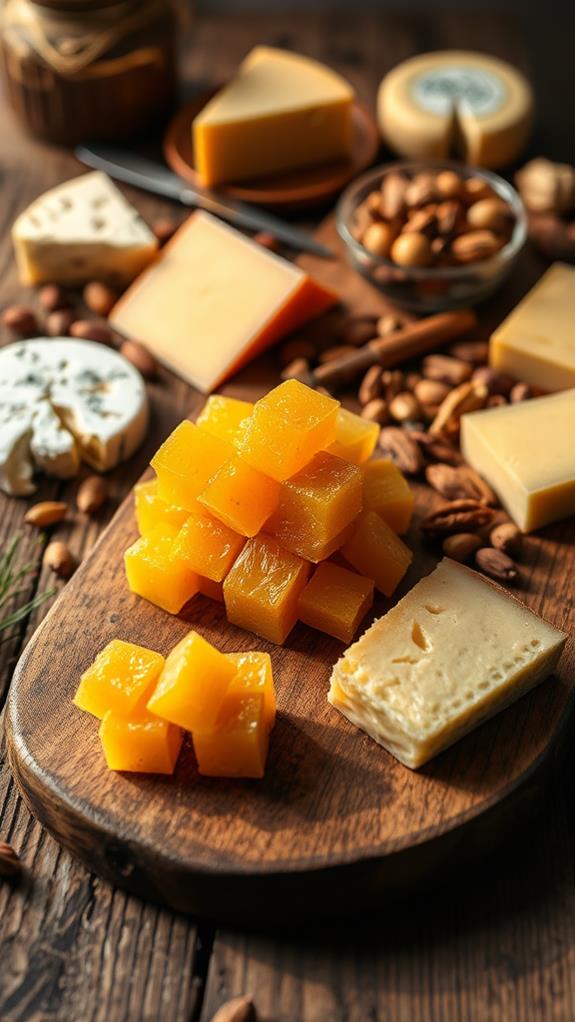
Chefs and food enthusiasts have long embraced honeycomb as a versatile ingredient in various culinary applications. You'll find it used in both sweet and savory dishes, adding a unique texture and natural sweetness. Honeycomb can be:
- Crumbled over salads for a crunchy, sweet contrast
- Melted into sauces or glazes for meats
- Incorporated into desserts like ice cream or cheesecake
- Used as a garnish for cheese platters
- Stirred into yogurt or oatmeal for breakfast
When cooking with honeycomb, you'll notice it has a more complex flavor profile than liquid honey. Its waxy structure breaks down when heated, infusing dishes with a rich, floral taste. You can also use it as a natural sweetener in baking, replacing sugar in some recipes. Remember that honeycomb's flavor can vary depending on the flowers the bees visited, so you might want to taste it before adding it to your dishes. From the perspective of SEO, incorporating keywords like "culinary uses of honeycomb" or "cooking with honeycomb" can help your content rank higher in search engine results pages (SERPs) for relevant queries.
Environmental Impact
While honeycomb offers culinary delights, it's important to ponder its environmental implications. When you consume honeycomb, you're directly impacting bee populations and their ecosystems. Bees are pivotal pollinators, and their role in maintaining biodiversity can't be overstated. However, responsible beekeeping practices can mitigate these concerns.
Consider the following environmental aspects of honeycomb production:
| Factor | Positive Impact | Negative Impact |
|---|---|---|
| Pollination | Supports plant diversity | Potential competition with native pollinators |
| Land Use | Promotes conservation of flowering habitats | May lead to monoculture for honey production |
| Pesticides | Encourages organic farming practices | Risk of contamination in non-organic operations |
| Carbon Footprint | Low emissions in local production | Higher emissions for long-distance transportation |
| Biodiversity | Maintains bee genetic diversity | Possible introduction of non-native species |
When you choose to eat honeycomb, you're participating in a complex ecological system. It's essential to source your honeycomb from sustainable, local beekeepers who prioritize bee health and environmental stewardship. By doing so, you're supporting practices that balance human consumption with ecosystem preservation, ensuring that the benefits of honeycomb can be enjoyed responsibly for generations to come.
Sourcing Ethical Honeycomb
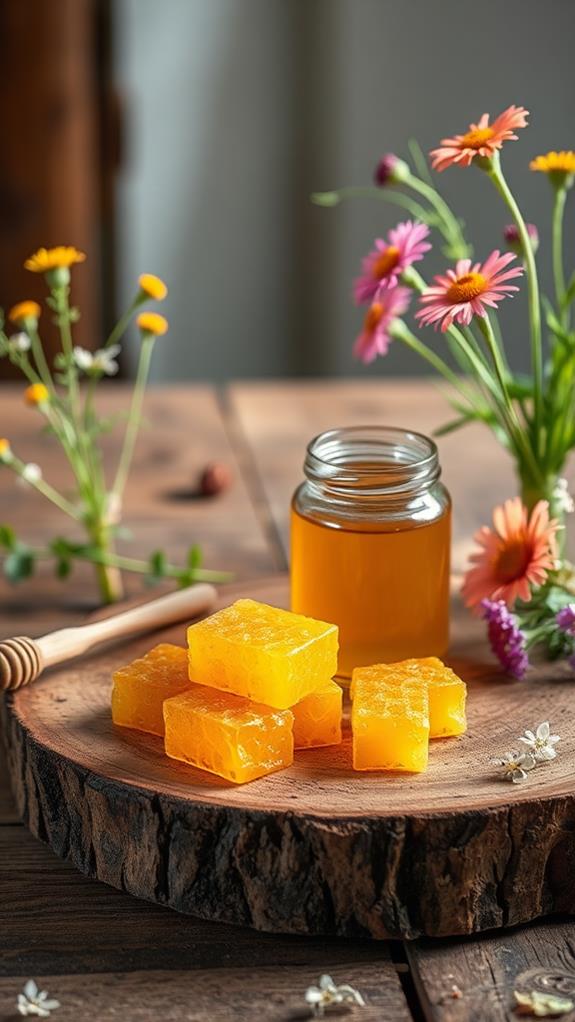
When it comes to sourcing ethical honeycomb, you'll need to do some homework. Start by researching local beekeepers and honey producers in your area. Look for those who prioritize sustainable and ethical practices, such as avoiding pesticides and providing proper care for their bees. Many small-scale beekeepers sell their products at farmers' markets or through community-supported agriculture programs.
When evaluating a potential source, consider these factors:
- Hive management practices
- Bee health and welfare
- Environmental impact of the operation
- Use of chemicals or antibiotics
- Transparency about harvesting methods
Don't hesitate to ask questions about their beekeeping practices. Ethical producers will usually be happy to share information about their methods. You can also look for certifications like organic or fair trade, which indicate adherence to specific standards. However, keep in mind that smaller operations may not have these certifications due to cost, even if they follow ethical practices.
Consider visiting the apiary if possible. This firsthand experience can give you valuable insights into the beekeeper's methods and the overall health of the hives. By taking these steps, you'll be better equipped to source honeycomb that aligns with your ethical standards.
Alternatives to Raw Honeycomb
Several alternatives to raw honeycomb can satisfy your craving for honey's sweetness and texture. If you're looking for options that mimic the experience of eating honeycomb, consider trying these substitutes:
| Alternative | Texture | Flavor Profile | Availability |
|---|---|---|---|
| Crystallized Honey | Grainy | Rich, intense | Common |
| Honey Sticks | Chewy | Varied | Specialty |
| Honeycomb Candy | Crunchy | Sweet, light | Artisanal |
| Honey-flavored Waffles | Crisp, airy | Mild, sweet | Grocery |
These alternatives offer unique experiences while avoiding potential risks associated with raw honeycomb. Crystallized honey, for instance, provides a similar texture to honeycomb without the wax. Honey sticks, also known as honey straws, offer a convenient, portable option with various flavors. Honeycomb candy, made from sugar and baking soda, mimics the hexagonal structure of real honeycomb. Additionally, honey-flavored waffles can satisfy your craving with a crispy texture and subtle honey taste.
When choosing alternatives, consider factors like ingredient quality, processing methods, and nutritional value. Some options may contain added sugars or preservatives, so always check labels carefully. By exploring these alternatives, you can enjoy honey-like experiences while maintaining dietary preferences or addressing health concerns.
Frequently Asked Questions
Can Pregnant Women Eat Honeycomb Safely?
If you're pregnant, you can generally eat honeycomb safely. It's a natural, unprocessed form of honey that contains beeswax, pollen, and propolis. These elements can provide additional nutrients and potential health benefits. However, as with any honey product, confirm it's from a reputable source to avoid the risk of botulism. If you have concerns about allergies or specific health conditions, it's always best to consult your healthcare provider before adding honeycomb to your diet during pregnancy.
How Long Does Honeycomb Last When Stored Properly?
Happily, honeycomb has a hefty shelf life. When you store it properly, it can last for several months to a year. To preserve its pristine quality, keep your honeycomb in an airtight container at room temperature, away from direct sunlight and heat. You'll want to avoid refrigeration, as it can cause crystallization. If you notice any signs of fermentation or mold, it's best to discard the honeycomb. Always check for freshness before consuming, especially if it's been stored for an extended period.
Is Honeycomb Suitable for Diabetics?
If you're diabetic, you should approach honeycomb with caution. While it's a natural product, honeycomb is fundamentally pure sugar, which can rapidly raise your blood glucose levels. It's not entirely off-limits, but you'll need to consume it in very small amounts and factor it into your daily carbohydrate intake. It's critical to consult your healthcare provider or a registered dietitian before incorporating honeycomb into your diet. They can help you determine if and how it fits into your diabetes management plan.
Can Honeycomb Be Used in Beauty or Skincare Routines?
You can indeed use honeycomb in beauty and skincare routines. It's a natural ingredient that offers various benefits for your skin. You'll find it in some face masks, scrubs, and moisturizers. Honeycomb contains enzymes and antioxidants that may help with skin healing and hydration. It's also believed to have antibacterial properties, which could be beneficial for acne-prone skin. However, it is crucial to patch test any new product and consult a dermatologist if you have sensitive skin or allergies.
Are There Any Religious or Cultural Restrictions on Consuming Honeycomb?
Just as bees build their honeycombs with precision, various religions and cultures have constructed specific rules around food consumption. You'll find that most major religions don't explicitly restrict honeycomb consumption. However, some strict vegetarian or vegan practitioners might avoid it due to concerns about bee exploitation. In Judaism, honeycomb is considered kosher and pareve. Islam generally permits honey consumption, including honeycomb. Buddhist and Hindu traditions typically don't prohibit it either. Always check with local religious leaders for specific guidance, as interpretations may vary.
Conclusion
As you've explored the world of honeycomb, you've coincidentally discovered its safety and potential benefits. It's generally safe to eat, but be aware of allergies and sourcing concerns. You can enjoy honeycomb's unique texture and nutritional value in various culinary applications. Remember, moderation is key. If you're environmentally conscious, consider alternatives or ethically sourced options. Ultimately, the decision to consume honeycomb is yours, based on your health needs and personal preferences.
